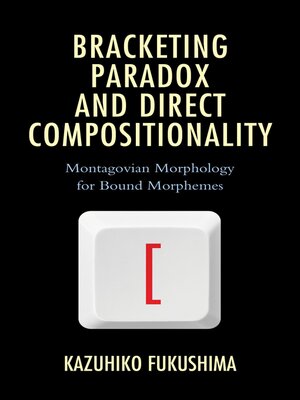Bracketing Paradox and Direct Compositionality
ebook ∣ Montagovian Morphology for Bound Morphemes
By Kazuhiko Fukushima

Sign up to save your library
With an OverDrive account, you can save your favorite libraries for at-a-glance information about availability. Find out more about OverDrive accounts.
Find this title in Libby, the library reading app by OverDrive.



Search for a digital library with this title
Title found at these libraries:
| Library Name | Distance |
|---|---|
| Loading... |
In Bracketing Paradox and Direct Compositionality: Montagovian Morphology for Bound Morphemes, Kazuhiko Fukushima resolves bracketing paradoxes in Japanese—morphological vs. semantic incongruity, which supposedly pose insurmountable obstacles to traditional and simple-minded morphology—within morphology (the lexicon) proper. This resolution is achieved through formal semantic apparatus developed by Richard Montague and his followers, hence the label Montagovian Morphology. More generally and theoretically, this book addresses the issue of the optimal interface between morphology, which deals with minimal units of meaning and their combination within a word, and semantics, which handles increasingly larger units of meaning in the sentence. Fukushima argues that the nature of the interface is directly compositional, requiring no complex syntactic supposition or manipulation other than putting words together as is. The author concludes that a semantically reinforced morphological—that is, lexical—approach is superior to a syntactic one for characterizing the mapping between morphological and semantic domains, and that syntax per se cannot supersede morphology.







